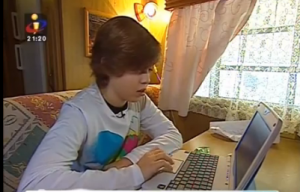The “Ensino a Distância para a Itinerância” (EDI, initially called “Escola Móvel”) is a distance-learning project of the Portuguese Ministry of Education and Science with the aim of ensuring schooling of students that cannot attend the regular school because the constant need of movement of their parents. It is the case of those working in the circus and fairs, but the project can also cover other specific disadvantaged situations, such as hospitalized children or teenage mothers. In the current academic year (2011/2012) 120 students are covered.
In this distance-learning project, the teaching activities are fully provided through online communication and interaction between students and teachers having as basis a set of resources developed by teachers themselves addressing subject-based and cross-curricular competencies, including interactive activities that foster autonomy and self-assessment.
The curricular activities cover all compulsory years of schooling from the 5th to the 12th grades. Although with some appropriate curricular adjustments to the specificity of the distance teaching and learning context, and the particularities inherent to the target students, the different subjects of the Portuguese national curriculum are taught online following a similar timetable organization as it is done in the brick and mortar schools.
The students have to be online according to that timetable organized by year/class, interacting synchronously with their teachers and other students through chats and forums for analysis and discussion. Learning takes place online, during synchronous classes, where students access each subject interacting with the teacher, and also in an asynchronous way when they are free to use ICT tools (e.g. YouTube, blogging, etc..) and other digital resources available.
In order to accompany the schoolwork that students are asked to perform outside of the classes, other synchronous tutoring activities are provided. Doing that, teachers are able to follow and track each student in a more close and individualized way, allowing as well a closer relationship between the school and students’ families. Each class of students has two tutors, except those of the 5th grade and of the classes of the vocational secondary education, with only one tutor. The pedagogy followed is student-centered, aiming at personalized learning based on continuous feedback.
In order to avoid isolation and promote interpersonal competencies, itinerant students are also encouraged to take their laptops to the nearest school’s resource center or library – where their families are working at that moment – and access the virtual platform from there.
Currently the project is organized through partnerships with public schools and a welfare institution and has also the support of some private institutions concerned with the social goals of the initiative (foundations, editors, etc.).
